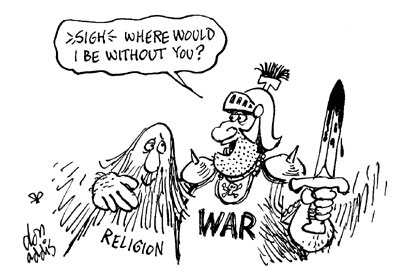Continuing with Frye on religion and democracy, here he is in The Modern Century:
[D]emocracy can hardly function with a closed myth, and books of the type I have mentioned as contributions to our mythology, however illuminating and helpful, cannot, in a free society, be given any authority beyond what they earn by their own merits. That is, an open mythology has no canon. Similarly, there can be no general elite in a democratic society: in a democracy everybody belongs to some kind of elite, which derives from the social function a particular knowledge or skill that no other group has.
The earlier closed mythology of the Western world was a religion, and the emergence of an open mythology has brought about a cultural crisis which is at bottom a religious crisis. Traditionally, there are two elements in religion, considered as such apart from a definite faith. One is the primitive element of religio, the collection of duties, rituals, and observances which are binding on all members of a community. In this sense Marxism and the American way of life are religions. The other is the sense of a transcendence of the ordinary categories of human experience, a transcendence normally expressed by the words “infinite” and “eternal.” As a structure of belief, religion is generally weakened; it has no secular power to back it up, and its mandates affect far fewer people, and those far less completely, than a century ago. What is significant is not so much the losing of faith as the losing of guilt feelings about losing it. Religion tends increasingly to make its primary impact, not as a system of taught and learned belief, but as an imaginary structure which, whether “true” or not, has imaginative consistency and imaginative informing power. In other words, it makes its essential appeal as myth or possible truth, and whatever belief it attracts follows from that. (CW 11, 67)
This is not what we’re seeing from the highly politicized religious right: it tends to be aggressive and exclusionary, and the agenda seems largely driven by intolerance of secular values as well as resentment of the freedoms they promiscuously provide irrespective of belief, gender or sexual preference. Issues relating to these areas, at any rate, always seem to be top-of-the-list targets. Want to make a religious conservative group resolutely committed to political action? Just raise the issue of gay marriage or the rights of women over their own bodies. It never misses.
I will be posting a list of agencies and organizations that have already been defunded by the Conservatives. Those no longer worthy of government assistance unmistakably have the “wrong” set of priorities: women’s organizations, agencies offering various kinds of assistance to the poor, including immigrants and children, and organizations promoting gay rights, among a number of others with a recognizable progressive mandate. It is a persistent pattern of behavior.

